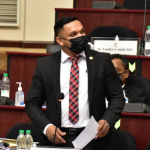
The Opposition has raised a number of concerns about the draft Petroleum Activities Bill, indicating today that the Bill fails to address a number of pertinent issues including insurance and liability coverage, auctioning of the country’s petroleum blocks, and the need for companies to comply with the Extractive Industries Transparency Initiative (EITI) standards.
The Petroleum Activities Bill, which is intended to replace the Petroleum (Exploration and Production) Act, provides for the exploration, production, storage and transportation of petroleum.
In releasing the draft legislation last week, the Government said the updated Bill addresses safety, emergency response, cross-border unitisation, and the supervision and monitoring of petroleum activities here.
But the Opposition, in a statement today, said the Government missed an opportunity to adequately respond to a number of the issues and challenges that have surfaced since the country started producing oil in December, 2019.
“From our preliminary review of the just-released Petroleum Activities Bill, we are dismayed by how unresponsive the PPP is with regards to the experience gained and lessons learnt from the problems and challenges that have engulfed the local Oil and Gas industry over the last few years,” the Opposition said.
According to the Opposition, the Bill is muted on insurance and liability issues, despite the serious legal disputes that have arisen in the courts.
“This Bill potentially provides a good opportunity for us to tighten Guyana’s legislative framework so that citizens can be confident that the company assumes full liability for all environmental and industrial damages and accidents, (including oil spills) both in response to and outside of all claims and demands,” the Opposition reasoned.
Further, the Opposition said the Bill has fallen short on addressing the principles and rules that should govern the auctioning of the country’s Petroleum Blocks. Such principles and rules, it said should promote transparency, consistency, and predictability, and should reduce opportunities for corruption, insider trading, and flipping of leases or concessions.
Though the Natural Resource Fund Act currently governs the use of the country’s oil revenues, the Opposition made a case for the Petroleum Activities Bill to regulate Government’s spending on infrastructural projects.
It warned that the “unregulated and underhand expenditure” could lead to high-level corruption and misuse and waste of public funds.
“At minimum, such company/government agreements must be tabled in Parliament for scrutiny, debate, and approval — as for any other government spending of the people’s money,” the Opposition said.
Additionally, while underscoring the importance of audits in ensuring the country gets its rightful share of oil revenues, the Opposition said it was critical for those audits to be conducted and completed in keeping with established timelines.
“The petroleum activities law, in tandem with the country’s financial acts, must mandate the timely conduct of audits and the timely release by government of audit results to parliament and the public. Penalties should be instituted on companies for the deliberate provision of false, incomplete, and deceptive information during an audit,” it recommended.
Under the proposed legislation, the Government, through the Natural Resources Minister, is empowered to defer payment of any royalty by a company. The Opposition, while taking no issue with the Government seeking to help companies through financial crisis, expressed concern that there is no reciprocal or in-fairness provision for increasing royalty rates in situations where companies benefit from sustained high oil prices.
According to the Opposition, the legislation should make provisions for a price-based, pre-set sliding or variable royalty rate as obtains in the local gold industry.
It also expressed the need for companies to comply with the Extractive Industries Transparency
Initiative (EITI) standards. It is also calling for the two-week consultative period to be further extended.



















You must be logged in to post a comment Login